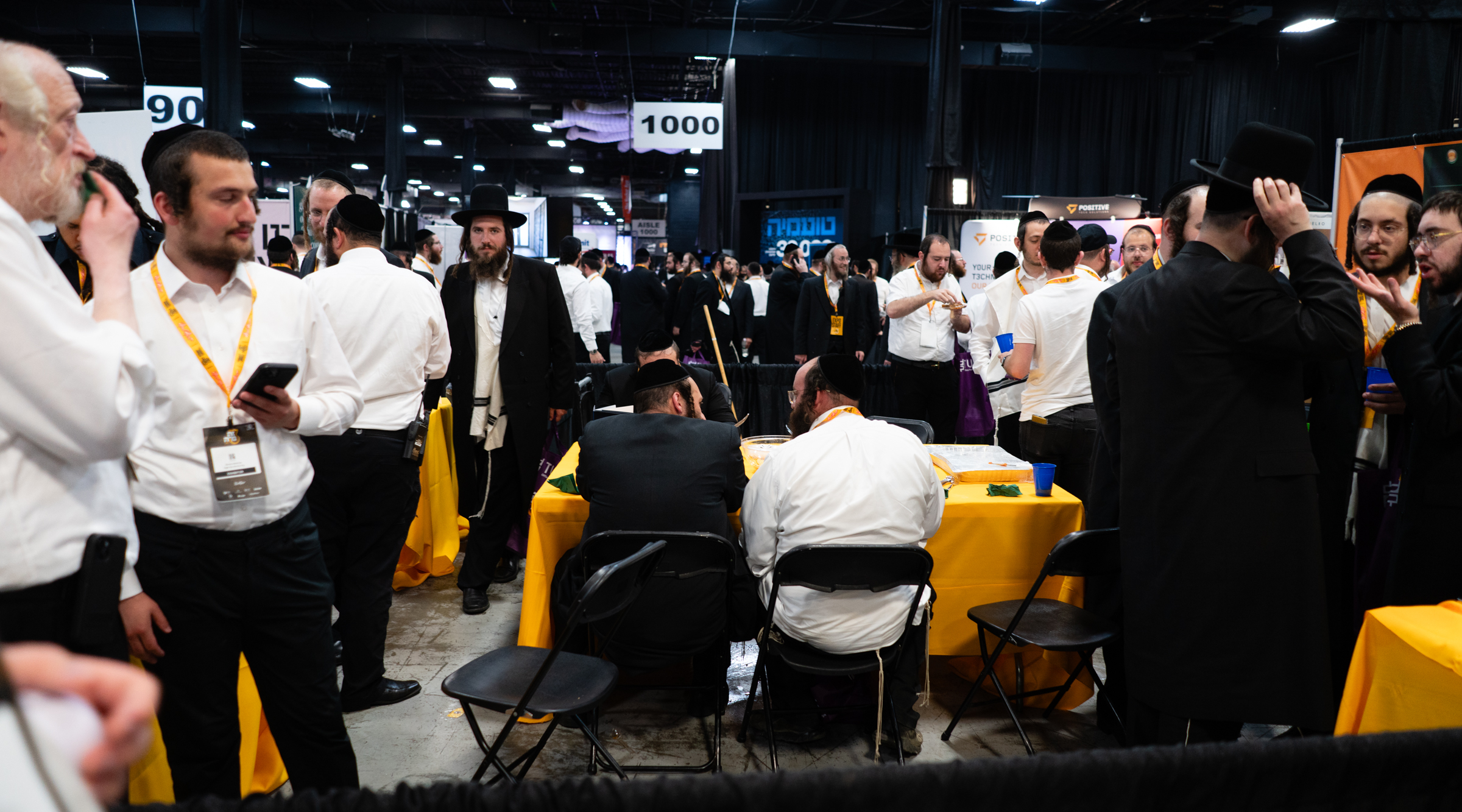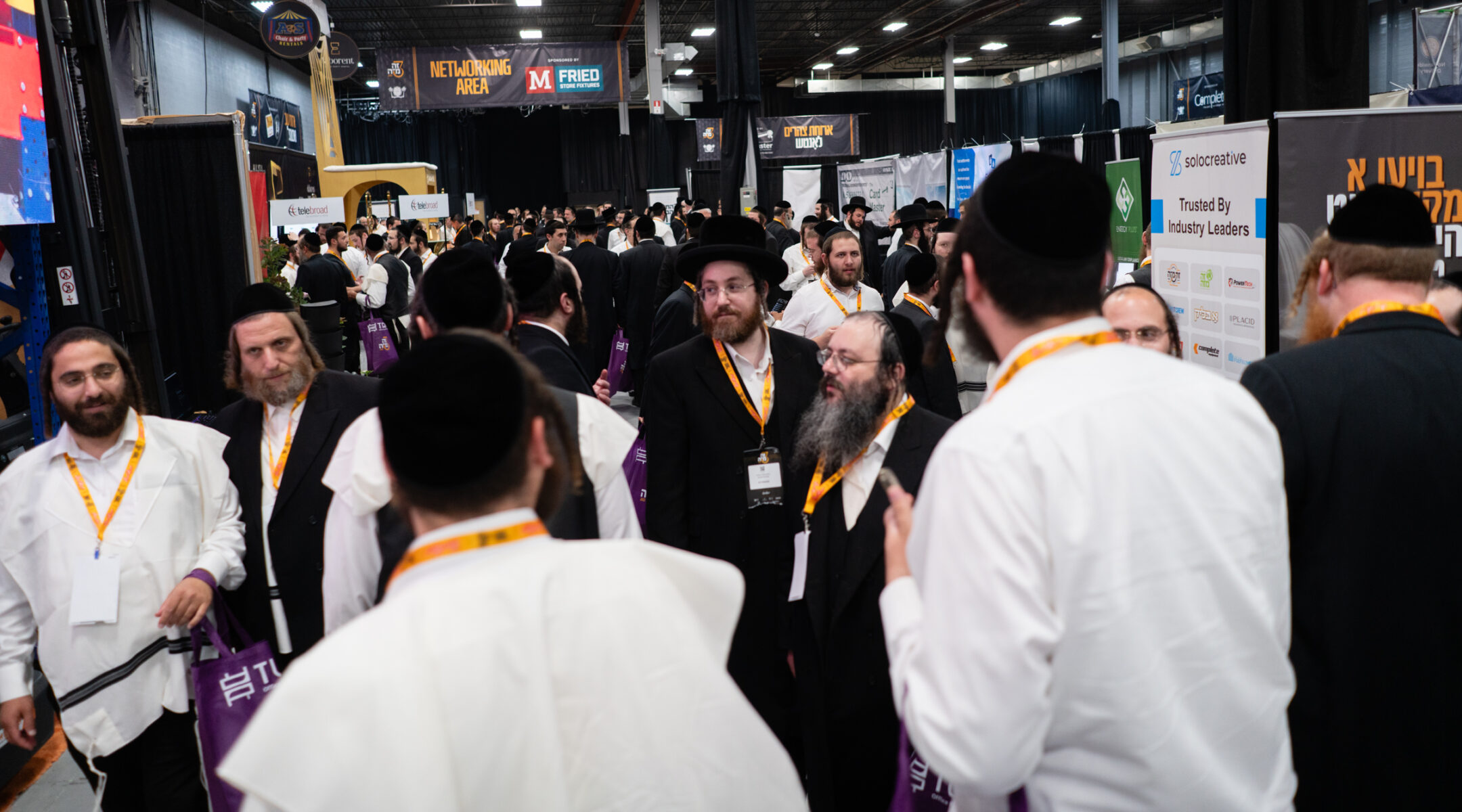Thousands of Hasidic Jews packed into a New Jersey convention center on Wednesday for the annual Satmar Business Expo, an event that showcased entrepreneurship in a tight-knit community better known for its piety and insularity.
The hundreds of booths at the expo represented businesses peddling financial consulting services, kosher wine and travel, vacuum cleaners, custom closets, masonry and welding. A company offering corporate food platters offered up crackers with fish spreads, while passersby peered into the windows of a black Tesla Cybertruck parked alongside the display of a utilities company.
Colorful signs in Yiddish and English adorned the booths, where business owners pitched their goods and services and exchanged business cards with interested customers. Other attendees chatted at tables in a “networking area” or prayed in a room set aside for worship.
Organizers said the event was likely the largest Jewish business expo in the country and was aimed at fostering connections. Exhibitors and attendees were mostly — but not exclusively — from the Satmar community, a Hasidic movement with bases in the Brooklyn neighborhood of Williamsburg and the upstate village of Kiryas Joel, and hailed from around the tri-state area.
“The idea behind it, we are a very tight-knit community, so people need to know what their neighbors are doing, what their friends are doing,” said Yoel Fried, one of the event’s organizers. “People should do business with each other.”
The event also underlined differences among the fervently Orthodox Jews known alternately as haredi or ultra-Orthodox. In Israel, where Torah study is subsidized by the government and many haredi men opt to study full time instead of work, secular Jews complain that the lifestyle is a drain on the economy and municipal budgets.
The Satmar, by contrast, have a work ethic dating back to the movement’s establishment in Williamsburg in the wake of the Holocaust, said Nathaniel Deutsch, who co-authored a 2021 book with Michael Casper about Hasidic Williamsburg called “A Fortress in Brooklyn.”
The Satmar spiritual leader at the time, Rabbi Joel Teitelbaum, encouraged his followers to earn a living.
“He thought that the ideal is somebody who’s working and learning Torah at the same time, not somebody who’s just completely devoted to learning Torah,” Deutsch said of Teitelbaum. “That has affected the course of the community through its history.”
As a result, the community is geared toward small business ownership and has a “large working class element,” with men participating in trades such as plumbing, construction and truck driving, Deutsch said.
Martin Schwarz, the co-founder of the payroll and team management platform Friday, said the community’s large families and the cost of tuition for private schools encouraged many to get into business.
“Having a regular 9 to 5, for most people, it just won’t add up [financially], especially when you live in New York,” said Schwarz, who was attending the expo for the third year. “So you have to get out there and have to innovate, do something, be entrepreneurial in order to get somewhere.”
The event, now in its third year, featured 412 businesses and organizers expected around 6,000 people to attend. Held at the New Jersey Convention and Exposition Center in Edison, New Jersey, the expo was funded by Yetev Lev D’Satmar, a leading congregation in Williamsburg, and was organized by Fried’s marketing company, FriedCo Media.
Exhibitors said the event was an opportunity to connect with both customers and other businesses.
“It doesn’t bring us so much money. I would say it’s more a way to connect to the community,” said Yisroel Elek, the CEO of Plan it Rite, a company offering kosher travel packages to destinations including Ukraine, South Africa and Guatemala.
“We get live feedback from people and we always find some new leads, show our customers our face,” said Elek, who added he connected with other businesses at the expo in the past, such as a customer service company that Plan it Rite worked with after the event.
Noble Wines, a company with offices in Europe and Pomona, New York, distributed glossy catalogs featuring its selection of kosher wines from France and Italy. Wooden racks displayed bottles of French Malbecs and Haut-Médoc alongside grape vines the company imported from California for the expo.

The third annual Satmar Business Expo in Edison, New Jersey, July 17, 2024. (Luke Tress)
Abe Israel, a co-owner of the company, said the company connected with wholesale retailers and other customers at the expo and had first come to the event two years ago, while Noble Wines was hesitating over whether it should expand into the United States.
“The show made our decision to do this big move and establish ourselves in the USA,” Israel said. “When we saw how much people appreciated it, we decided to launch and formally establish ourselves here.”
Women were absent from the expo, as men and women traditionally occupy different roles in the Satmar community, with women focusing on raising the typically large families. Many women operate small businesses on the side, however, such as selling wigs, strollers or other products related to children, said Moshe Krakowski, a Yeshiva University professor who has studied the community and who attended the expo last year.
“You’ve got a lot of stuff that doesn’t show up at the expo because women are involved,” he said. “There are all sorts of little micro-businesses that women can do part time while they’re being mothers.”
Entrepreneurship and small businesses are also emphasized in a community whose yeshiva school system largely eschews secular subjects. The community largely frowns on higher education outside of yeshivas, leading to fewer members getting into professional fields such as medicine or law. That leads to entrepreneurship as a common avenue to earning a living, Krakowski said.
At the same time, students study complex religious texts for long hours each day, learning high-level reading comprehension and logic skills that can carry over into fields such as programming, he added.
“There’s this real culture of entrepreneurship that has developed,” Krakowski said. “Anything that you do not need formal education for, they will jump into.”
In earlier decades, many members of Satmar worked in fields such as the garment industry and diamond trade. Real estate has also long been a major industry. As Williamsburg gentrified, many Satmar profited from real estate holdings they had acquired before prices skyrocketed. In recent years, many Satmar have made a living by selling through Amazon and other online shipping services. The kosher food industry is another major sector, said Deutch.
Those industries create opportunities for small business owners in related fields. Satmar entrepreneurs run businesses that offer software to track inventory in warehouses for online retailers, while others supply lumber to real estate companies. Exhibits at the expo included product photography for Amazon sellers, demolition services, asbestos removal and a company that provides electric vehicle installation services to property managers.
Many of the community’s businesses cater to other Hasidic Jews, while others operate outside the community, or employ non-Jewish workers, Deutsch said.
Isaac Gross, who runs the Williamsburg-based Amazon marketing company IG PPC, said he used to sell products on Amazon, then saw a need for PPC, or pay per click, management in the industry. He launched his business five years ago and now has around 200 customers and over 20 in-house employees. He learned the field on his own, he said.
“I taught myself, I spoke to people, a lot of online videos,” he said.

The third annual Satmar Business Expo in Edison, New Jersey, July 17, 2024. (Luke Tress)
Rabbi David Niederman, the head of the United Jewish Organization of Williamsburg and North Brooklyn, a social services organization, and a prominent community leader, said the expo was evidence of the community’s success. Criticism of the short shrift given to secular studies at yeshivas came to a head with a series of New York Times exposes in 2022 and remains a sensitive point for the community. The Times interviewed yeshiva graduates who said they lacked the skills for anything but menial jobs and relied on government welfare.
“The community is not interested in handouts, just the other way around, they want to make a living,” Niederman said. “All segments of the economy are presented over here by our people, our education in our school system, and look what they produce. This is something that people should understand.”
Despite the ethos of entrepreneurship, many families live below the poverty line in Satmar communities, although communal charities support those in need. Niederman said successful business people are expected to contribute at least 10% of their earnings to charity.
Communal structures such as Brooklyn’s Viewpoint Academy offer services including professional training and English lessons for those more comfortable in Yiddish, or assistance filling out government forms. The community also has a robust safety net that likely encourages entrepreneurs to take risks, Krakowski said.
Schwarz said trust within the community also smoothed the way for new businesses.
“Someone that starts a business, there’s a very easy way to get in because you know so many people, and even people you don’t know, there is someone else, your friend knows their friend,” he said.
The expo had a section dedicated to community services, such as mental health care and matchmaking for young couples. Shia Greenfeld of the UJO said the group ran classes for yeshiva graduates in such fields as architectural design and computer skills. The expo helped the group connect the program’s graduates with potential employers. UJO trained around 1,200 job seekers last year and had seen more than 400 visits to its booth by mid-afternoon on Wednesday, Greenfeld said.
“Every person exhibiting here, we’re trying to approach them to make sure whenever they are looking for an employee they will reach out to us,” he said.
The Satmar business ethos has occasionally created tensions with another of Teitelbaum’s tenets, however: an aversion to luxury and materialism. Rabbi Aaron Teitelbaum, Joel Teitelbaum’s nephew and the leader of one of two main Satmar factions, decreed new rules in the early 2000s to significantly reduce the cost and lavishness of weddings.
That friction was apparent in advertisements for the expo that stressed the event was conducted through the Satmar community and at a high spiritual standard, with times set aside for prayer. A video for last year’s event showed men praying early in the footage.
“There’s the potential within the community itself for people to critique some of this activity and say, ‘You’re focusing too much on materiality,’” Deutsch said. “You need to flag very explicitly that you’re aware that there is a potential danger associated with it and you are conducting this expo in a way that is consonant with the values of the community.”
The New York Jewish Week brings you the stories behind the headlines, keeping you connected to Jewish life in New York. Help sustain the reporting you trust by donating today.





